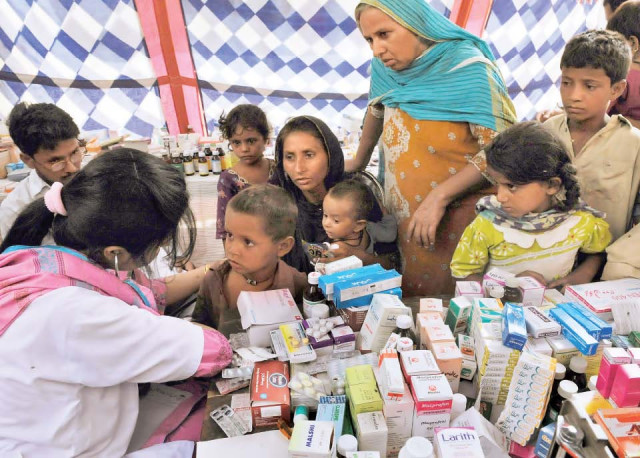Have MBBS, won’t travel
Flood survivors say female doctors are not around when they are needed most.

Have MBBS, won’t travel
“All of them want to return home by sunset because their parents don’t permit them to stay out later than that,” says Dr Mirza Ali Azhar, a consultant anaesthetist and member of the Pakistan Medical Association (PMA). “They [parents] are always worried about the law and order situation which has become a major hurdle especially at the time of natural calamities such as floods and earthquakes when doctors are required to work round the clock.”
The fear is not unfounded. Over the past few weeks since the Dow University of Health Sciences (DUHS) began sending its team of male doctors to flood-hit areas in Sindh, not only were their vehicles carrying relief goods attacked by regular mobs but several doctors were also mugged by locals. As a result, relief goods had to be guarded by a Rangers team.
Dr Rana Masood, professor of Medicine at DUHS, added that late-night duties are the toughest in these areas, particularly Gadap and SITE towns in Karachi, where the camps have been set up. “Every time a doctor returns late from a camp, they come complaining the next day that their cell phone got snatched or they got pick-pocketed. As a result, they are discouraged from volunteering there and we then have nobody to send to these areas because women simply don’t come forward.”
Dr Sidra Ahmed, who is practicing at a private hospital and graduated from Jinnah Medical and Dental College two years back, says she wouldn’t mind working in rural areas provided there were proper security measures in place by the government. “It’s not like we are unwilling to serve humanity, but I wouldn’t want to do it at the cost of my own life,” she says. The target killings of doctors in the city have added to her parents’ anxiety.
Citing examples of other professionals such as female journalists who are willing to stay late at work and in the field, Dr Omar Farooq, pro-vice chancellor at DUHS and principal of the Sindh Medical College, says this fear is unfounded. He feels that females - who form a majority of medical graduates every year - are generally disinterested in practicing.
Unemployed by choice
“A lot of them study medicine for good marriage proposals and once they achieve this goal, most of them choose their family over clinical practice,” says Dr Farooq.
And those who do wish to continue working are often discouraged by their husbands leaving them with little choice. Others prefer to migrate to the West or the Middle East for greener pastures. As a result, Pakistan’s official doctor-patient ratio currently stands at about 1:1,800. Unofficially, the figure can be as high as 1:2,300, says Dr Farooq.
In the present scenario, predicts Dr Mirza of the PMA, the country may run out of practicing doctors soon. However, there are a few of them like Shahfar Khan, a student of Ziauddin Medical University, who, after years of intensive studies, nights without sleep and rigorous exams, who are not willing to give up their careers. “My parents actually encouraged me to visit the flood-affected areas,” she says. The university sent out their medical teams to Risalpur, Jacobabad and Sibi with both male and female doctors.
Quota vs Merit system
Given the poor ratio, doctors suggest that the Supreme Court’s 1999 decision against the quota system in medical colleges be reconsidered in order to encourage male students to choose medicine.
Previously, all public medical colleges had a separate quota system for both men and women but a limited number of seats meant deserving students could not seek admission to their preferred college. In 1999, however, this was reversed to the open-merit system after a petition was filed by a female medical student. The court decided in her favour.
With open-merit admissions since then, more women have been able to pursue medical degrees. Some doctors feel now that this should be changed. “We are not against women entering this profession, but with the deteriorating law and order situation across the country, it is becoming difficult to persuade parents to allow their daughters to practice,” says DUHS’s Dr Rana Masood.
Recalling her experience from the 2005 earthquake, she said that DUHS had planned to send a team of 100 doctors to Mansehra and Balakot and bought air tickets for them. But only 30 of them agreed to go - all of them men. “The female doctors insisted we pay for either for their brothers or husbands to accompany them. We obviously couldn’t waste our tickets on them.”
For one, Dr Shershah Syed, an obstetrician and gynaecologist, does not think ending the open-merit system would help give male students a better chance of admissions to a medical school or lead to a better doctor-patient ratio for that matter.
“The reason fewer boys are opting for medical studies is because they are simply not interested,” he says. “With low salaries and poor working conditions, it is no longer practical for a man to consider this profession.”
In his opinion, it is only when the government decides to turn medicine into a respectable profession and protect the interests of doctors that men and women will be willing to practice in their own country.
Published in The Express Tribune, October 10th, 2010.



















COMMENTS
Comments are moderated and generally will be posted if they are on-topic and not abusive.
For more information, please see our Comments FAQ